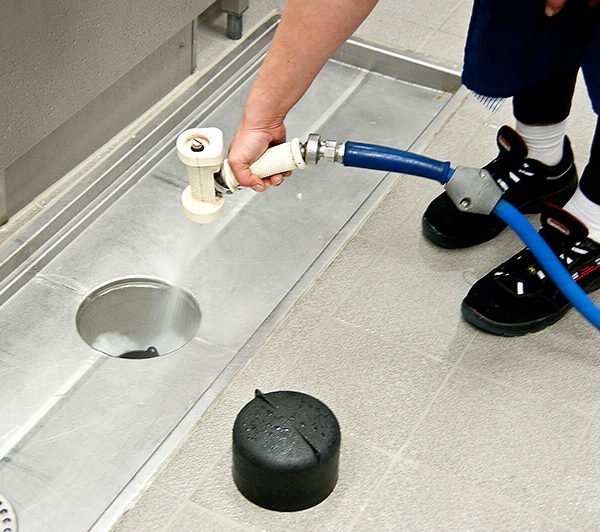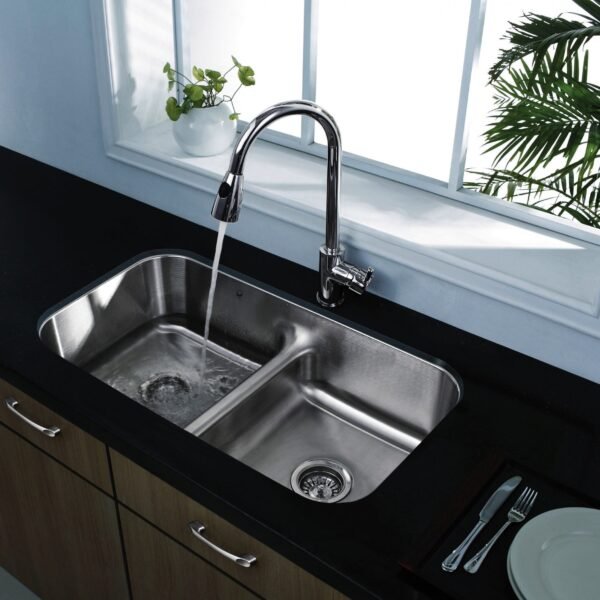Choosing the right clogged drain plumber is crucial for maintaining the efficiency and safety of your home’s plumbing system. In this article, we’ll explore 10 essential tips to help you select a plumber who provides not only immediate relief but also long-term solutions. From verifying licenses and insurance to understanding their after-service support, these tips will guide you through the process of hiring a plumber who is trustworthy, skilled, and reliable.
Key Takeaways
- Ensure the plumber has the proper license and insurance to protect yourself and your property.
- Consider the plumber’s experience and reputation in the industry for quality service.
- Understand the cost and payment options upfront to avoid any surprises or hidden fees.
- Check the plumber’s availability and response time, especially for emergency situations.
- Inquire about warranties and work guarantees to ensure long-term satisfaction with the plumbing work.
1. License and Insurance
Ensuring that your plumber is licensed and insured is crucial for a safe and compliant service. A license confirms that the plumber has met industry standards and is authorized to work in your area. Insurance, on the other hand, provides a safety net for both parties involved.
- License: Verifies professional training and adherence to building codes.
- Insurance: Offers protection against accidents and potential damages on the job.
It’s not just about meeting legal requirements; it’s about peace of mind. Hiring a licensed and insured plumber means that you are entrusting your property to a qualified professional who is prepared to handle any unforeseen situations.
2. Experience and Reputation
When it comes to resolving a clogged drain, the experience of the plumber is paramount. A seasoned professional has likely dealt with a wide array of blockages, ensuring they can quickly diagnose and resolve your issue. It’s important to inquire about the plumber’s experience with jobs similar to yours.
Reputation is equally crucial. A plumber’s reputation is often reflected in customer reviews and testimonials. Positive feedback from previous clients can be a strong indicator of reliability and quality of work. Check online review platforms and the plumber’s own website for customer insights.
A plumber with a solid track record and a wealth of experience is more likely to provide the high-quality service you need for your sewer line blockage.
Here are some key points to consider when evaluating a plumber’s experience and reputation:
- Number of years in the business
- Types of plumbing issues they’ve specialized in
- Feedback from previous customers
- Recognition or awards in the plumbing industry
3. Cost and Payment Options
Understanding the cost and payment options for clogged drain plumbing services is crucial. Prices can vary widely depending on the complexity of the job and the materials required. For instance, estimates for a clogged drain typically range from $125 to $275. However, these costs can fluctuate based on your location and the specifics of the plumbing issue.
When discussing costs, ensure you get a detailed breakdown of the expenses. A clear estimate should include the hourly labor cost, material cost, overhead, and any additional markup. This transparency allows you to budget accordingly and avoid surprises.
Payment methods are also an important consideration. Many plumbing services accept various forms of payment, including credit cards. Confirm with the plumber what payment options are available before work begins to ensure a smooth transaction.
Lastly, inquire about any service guarantees, such as compensation for late arrivals. Some companies offer a monetary credit for every minute they’re late, which underscores their commitment to timely service.
4. Availability and Response Time
In the realm of plumbing, a swift response can mitigate extensive damage, especially during emergencies. It’s essential to inquire about a plumber’s availability, particularly if they offer services beyond standard working hours.
- Do they operate on weekends or holidays?
- What are their typical response times?
- Are there additional fees for after-hours services?
These questions will help you gauge if a plumber is equipped to handle urgent situations, such as clogged drains or an overflowing toilet. Remember, a plumber’s promptness is not just a convenience but a necessity in preventing further damage.
A reliable plumber should offer clear communication about their availability and any extra charges for emergency calls. This transparency ensures you’re not caught off guard when a plumbing issue arises outside of normal hours.
5. Warranty and Work Guarantee
When hiring a clogged drain plumber, it’s crucial to inquire about their warranty and work guarantee policies. These assurances are a testament to a plumber’s confidence in their workmanship and their commitment to customer satisfaction.
- Duration: Understand how long the warranty lasts and what specific aspects of the repair or installation are covered.
- Scope: Clarify what is included in the guarantee, such as parts and labor, and any exclusions that may apply.
- Resolution: Know the process for claiming the warranty or guarantee if an issue arises after the service is completed.
A solid warranty and work guarantee can save you from future headaches and additional expenses, ensuring that any post-repair problems are rectified promptly and efficiently.
Always review the terms carefully to ensure they meet your expectations and provide the necessary protection for your plumbing investment.
6. References and Testimonials
When selecting a plumber for a clogged drain, don’t overlook the importance of references and testimonials. These insights can provide a candid look at the plumber’s previous work and customer satisfaction levels.
- Ask for a list of recent clients and reach out to them directly.
- Look for online reviews on platforms like Birdeye to gauge broader community feedback.
- Pay attention to recurring themes in feedback, whether positive or negative.
It’s crucial to assess the plumber’s track record with past clients to ensure reliability and quality of service.
Remember, the internet provides a valuable resource for checking reviews and references beyond the company’s own marketing materials. A plumber’s reputation is often reflected in the experiences shared by others.
7. Professionalism and Communication
When hiring a clogged drain plumber, professionalism should be a cornerstone of the service provider you choose. This includes punctuality, a respectful communication style, and a clear understanding of the job at hand. A professional plumber will not only respect your time by arriving on schedule but will also communicate effectively about the scope of work and any complications that may arise.
Effective communication is not just about clarity; it’s about creating a partnership between you and the plumber. A competent plumber should be able to explain the problem, the necessary repairs, and the associated costs in terms that you can easily understand. This level of transparency is crucial for building trust and ensuring that you feel informed and involved throughout the service.
Good communication also entails keeping you updated on the progress of the job and any changes that may occur. It’s through this healthy exchange of information that a level of confidence is built, which is essential for a successful service experience.
Lastly, consider the plumber’s customer service skills, which include empathy, reliability, and transparency. These qualities are essential for success in the plumbing industry and contribute to a positive service experience.
8. Tools and Equipment
The right tools and equipment are crucial for effectively dealing with a clogged drain, especially when dealing with grease in secondary line issues. A plumber should have a comprehensive set of tools that not only allows them to tackle common problems but also the more complex ones.
A well-equipped plumber is prepared to handle a variety of plumbing challenges, ensuring a quick and efficient resolution.
For instance, a list of essential tools might include high-pressure water jetters for clearing out grease and debris, motorized drain snakes, and video inspection equipment for diagnosing issues deep within pipes. It’s important to inquire about the tools your plumber will use, as modern and well-maintained equipment can significantly affect the outcome of the repair.
9. Knowledge of Local Codes
Understanding local plumbing codes is crucial when hiring a clogged drain plumber. Plumbers must be well-versed in these regulations to ensure that any work performed is compliant and safe. For instance, dealing with roots in sewer main issues requires specific knowledge of local codes to address the problem effectively.
A plumber’s knowledge of local codes is not just about compliance; it’s about ensuring the longevity and reliability of your plumbing system.
It’s important to verify that the plumber you’re considering is up-to-date with the latest code requirements. This can often be reflected in their licensing and certifications. For example, a Cross Connection Control Device Inspector certification indicates a plumber’s qualification to handle certain types of plumbing issues in accordance with local codes.
10. After-Service Support
After-service support is crucial when dealing with plumbing issues such as a floor drain backing up, toilet backing up, or sink backing up. A reliable plumber should offer clear guidelines on how to handle any potential post-service complications.
- Immediate assistance for recurring issues
- Advice on preventing future blockages
- Follow-up checks to ensure the problem is resolved
Ensuring that your plumber provides after-service support can significantly reduce the stress associated with unexpected plumbing emergencies.
It’s not just about fixing the problem; it’s about maintaining a relationship with a service provider who values your peace of mind and is committed to the longevity of their work.
Conclusion
In conclusion, hiring the right clogged drain plumber goes beyond a quick fix; it’s about ensuring your home’s plumbing system operates optimally for the long haul. The tips provided in this article are designed to arm you with the knowledge to select a plumber who is not only qualified but also trustworthy and efficient. Remember that the cheapest option may not always be the best choice. By asking the right questions, using preventative measures like strainers, and seeking professional help when necessary, you can maintain a healthy plumbing system and avoid the inconvenience and expense of recurring issues. Make an informed decision and invest in a plumber who will contribute to the longevity and safety of your home’s plumbing infrastructure.
Frequently Asked Questions
What should I check for to ensure a plumber is legally allowed to work in my area?
Always verify that the plumber has a valid license and is insured to work in your area. This ensures they meet the local regulations and standards for plumbing services.
How important is experience when choosing a plumber for a clogged drain?
Experience is crucial as it reflects the plumber’s ability to handle a variety of situations. An experienced plumber with a good reputation is likely to provide reliable and effective solutions.
What kind of payment options should I expect from a plumbing service?
Most plumbing services offer multiple payment options, including cash, credit cards, and sometimes financing plans. It’s important to discuss payment terms before work begins.
How quickly should a plumber be able to respond to an emergency clogged drain?
Response time can vary, but for emergency services, a plumber should offer prompt assistance, ideally within a few hours of your call.
What does a work guarantee or warranty from a plumber typically cover?
A work guarantee or warranty should cover any faults in the workmanship and sometimes parts, for a specified period. This offers you protection against recurring issues.
Why are references and testimonials important when hiring a plumber?
They provide insight into the plumber’s past work and customer satisfaction. Positive references and testimonials are indicators of reliable and quality service.
How can I assess a plumber’s professionalism and communication skills?
Assess their punctuality, appearance, willingness to answer questions, and clarity in explaining the issue and proposed solutions. Good communication is key to a satisfactory service experience.
Should a plumber be familiar with local codes and regulations?
Yes, knowledge of local codes ensures that all plumbing work is compliant with regional safety standards, which is essential for the long-term reliability of your plumbing system.




